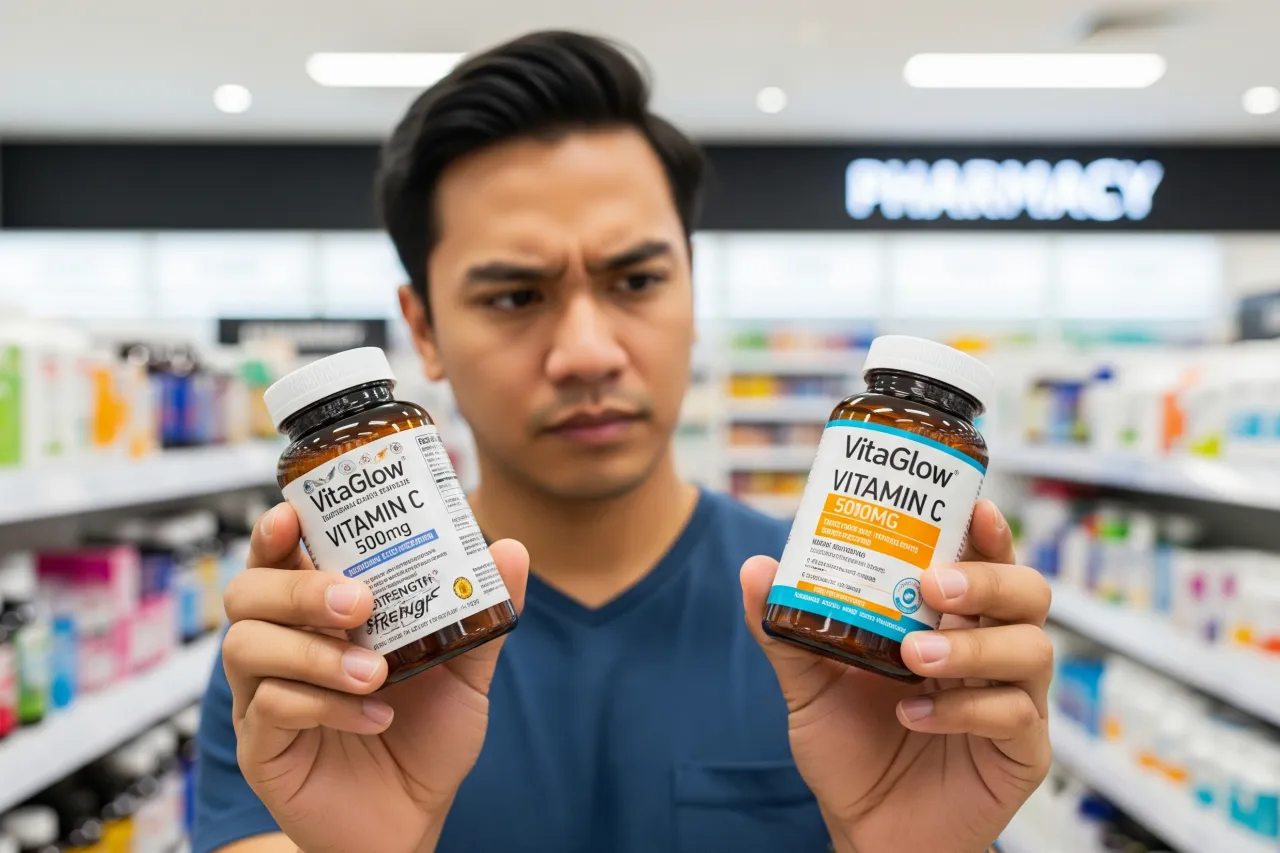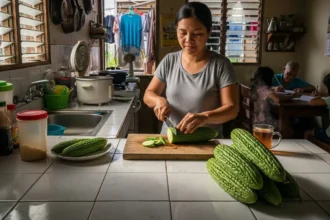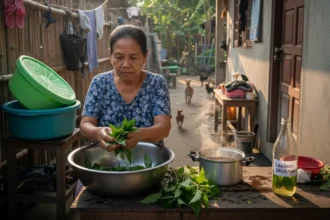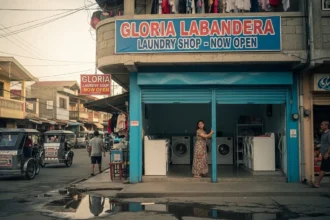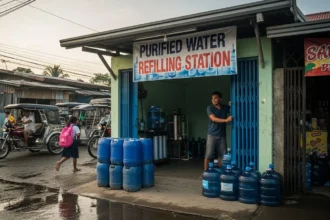Vitamins and supplements are part of many Filipinos’ daily routine. From vitamin C for colds to multivitamins for energy, these products are sold everywhere – from big malls to online platforms. But as demand has grown, so has the market for fake vitamins.
- ⚠️ Why Fake Vitamins Are a Growing Problem
- 🚨 Health Risks of Counterfeit Supplements
- 🔎 How to Check Packaging and Labels
- 📱 Checking with the FDA
- 🌐 The Dangers of Buying Online
- 🇵🇭 Common Fake Brands Circulating in the Philippines
- 🛡️ Safe Buying Practices
- 📊 Table 1: Red Flags for Fake Vitamins
- ❓ Frequently Asked Questions (FAQ)
- ✨ Protecting Filipino Families from Counterfeit Health Risks
- 🦺 References
Counterfeit supplements are not just a waste of money; they can be dangerous to health. Some contain incorrect dosages, harmful fillers, or no active ingredients at all. For families trying to stay healthy, knowing how to distinguish between genuine and fake vitamins is crucial.
⚠️ Why Fake Vitamins Are a Growing Problem
In recent years, fake vitamins and counterfeit supplements have quietly become a serious health concern in the Philippines. What seems like a harmless bargain online or at a local tiangge can actually put families at risk of wasting money – or worse, endangering their health.
The Philippines, like many developing countries, has a thriving black market for pharmaceuticals and health products. Online sellers, unregulated markets, and even small pharmacies have been caught distributing counterfeit supplements that look almost identical to the real thing. For the average buyer, it’s often impossible to tell the difference at first glance.
Several factors fuel this growing problem:
- High Demand – Filipinos are becoming more health-conscious, especially after the pandemic. Daily vitamins, immune boosters, and herbal supplements are part of many households’ routines, which makes demand consistent.
- Weak Regulation on Online Platforms – While the FDA has rules, e-commerce sites like Shopee and Lazada, or Facebook Marketplace remain flooded with sellers who bypass proper checks. Some even fake FDA approval numbers.
- Price Sensitivity – With rising costs of living, many shoppers are easily tempted by cheap “branded” products. A bottle of Vitamin C that’s half the price seems like a steal – until you realize it’s counterfeit.
The result is a booming underground trade that not only robs consumers of their money but also exposes families to health risks. Fake vitamins may contain little to no active ingredients, or worse, harmful substances that could damage the liver, kidneys, or overall health.
In short: when it comes to supplements, the danger isn’t just in what’s missing – it’s in what might be secretly inside.
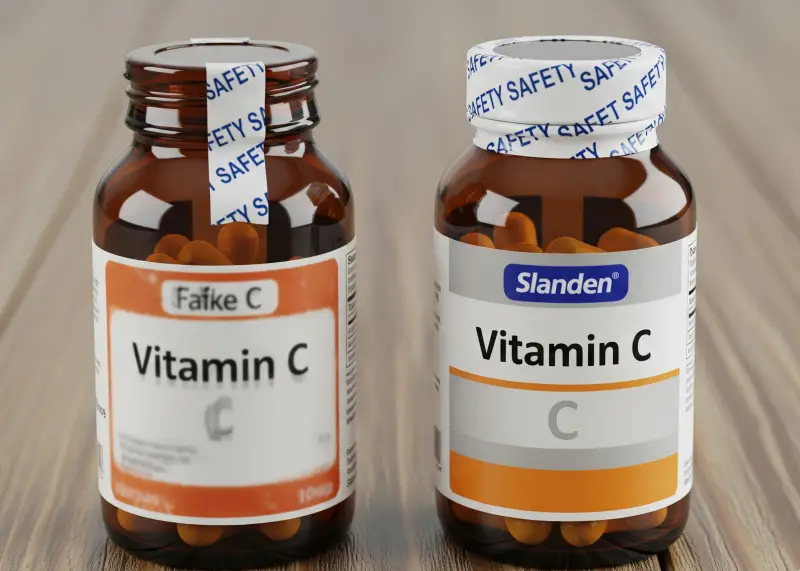
🚨 Health Risks of Counterfeit Supplements
The danger with fake vitamins is that you don’t really know what’s inside the bottle. Counterfeiters often use cheap fillers like chalk, starch, or sugar instead of real nutrients. In worse cases, tests have found traces of industrial chemicals that can damage vital organs like the liver, kidneys, or digestive system.
Here are some of the most serious risks:
- Ineffectiveness – Instead of boosting immunity or filling nutrient gaps, fake vitamins often do nothing. This leaves people vulnerable, especially those relying on them for daily health or chronic conditions.
- Overdose or Toxicity – Counterfeits may have incorrect dosages, leading to vitamin poisoning (e.g., too much Vitamin A or Iron can be dangerous).
- Allergic Reactions – Fake ingredients, flavorings, or colorants can trigger rashes, stomach upsets, or worse, severe allergic responses.
- Drug Interactions – Since counterfeiters don’t follow safety standards, hidden compounds may dangerously interact with prescribed medications, amplifying side effects or reducing treatment effectiveness.
- False Sense of Security – Perhaps the most alarming risk is false protection. People believe they’re strengthening their health, but in reality, they’re unprotected – and sometimes worse off than before.
When it comes to health, the stakes are simply too high. Buying fake vitamins is like gambling with your well-being – and sadly, it’s the unsuspecting families, especially the budget-conscious, who suffer the most.
🔎 How to Check Packaging and Labels
One of the quickest ways to spot fake vitamins is by carefully checking the packaging. Counterfeiters often cut costs on printing, materials, and details, which leaves behind clues that consumers can catch if they know what to look for.
Here are some common red flags:
- Misspelled Words or Awkward Grammar – Watch out for obvious typos (“Vitimin” instead of “Vitamin”) or sentences that sound poorly translated. Legitimate brands invest in proper labeling.
- Low-Quality Printing – Fake products often use dull colors, blurry fonts, or easily peeled stickers. Authentic brands usually have sharp, crisp, and professional packaging.
- Faded Expiration Dates or Batch Numbers – Expiry and lot numbers should be clearly printed and consistent. If they look smudged, faded, or tampered with, that’s a warning sign.
- Unsealed or Easily Opened Packaging – Most genuine supplements come with safety seals, shrink wraps, or holographic stickers. If these are missing, broken, or look cheap, don’t take the risk.
💡 Tip for Consumers: If you’ve been buying the same brand regularly, compare the packaging of your new purchase with older bottles. Even s
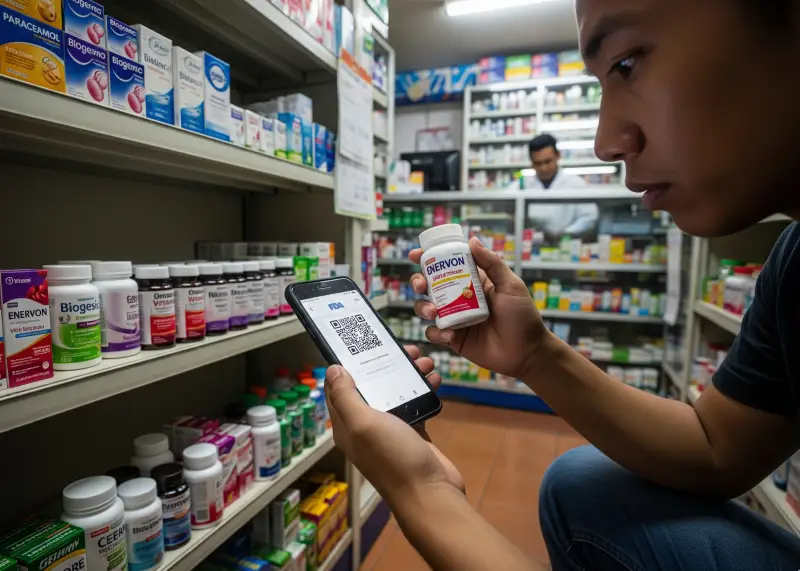
📱 Checking with the FDA
The Philippine Food and Drug Administration (FDA) maintains a database of approved supplements and medicines. Before buying, you can check if the product is registered.
Steps to verify authenticity:
- Visit the official FDA website.
- Use the Search for Registered Drug Products function.
- Type the product name or manufacturer.
- Confirm if the product has an active license.
If it’s not listed, chances are it’s unregistered or counterfeit. Always cross-check before buying from unfamiliar sellers.
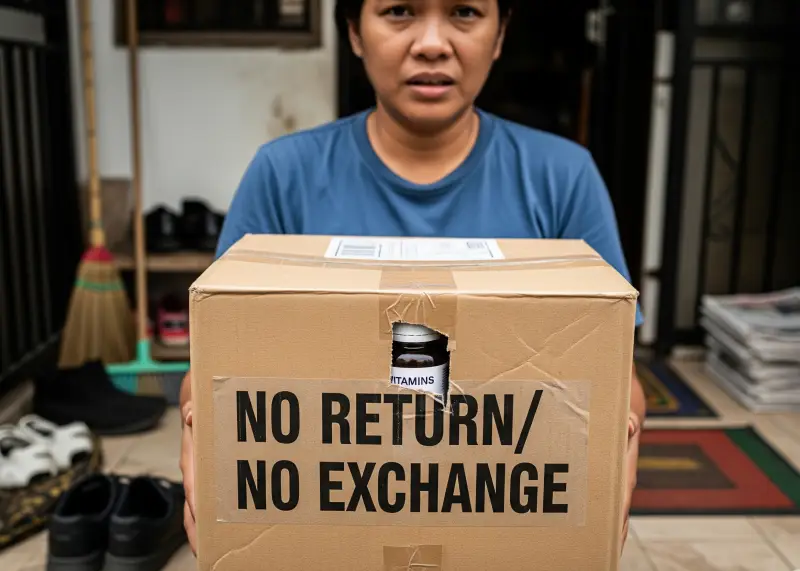
🌐 The Dangers of Buying Online
Online shopping has made life more convenient – a few clicks and your vitamins arrive at your doorstep. But that same convenience has also turned e-commerce platforms into hotspots for counterfeit health products. Scammers take advantage of the trust people place in these platforms and use tactics that can fool even careful buyers.
Here’s how fake sellers operate:
- Stolen Photos from Genuine Stores – They copy product images from official listings to make their posts look authentic.
- Fake Reviews and Ratings – Many create dummy accounts to flood their page with 5-star reviews and glowing feedback.
- Discount Bait – Counterfeits are often sold at unbelievably low prices to lure in bargain hunters. A “branded” vitamin bottle sold for half its normal price should raise suspicion.
💡 Safe Buying Tips:
The safest way to buy vitamins online is through verified brand stores or official pharmacy partners on platforms like Lazada, Shopee, or even the brand’s own website. Avoid random sellers with no track record, especially those without proper business details. Always check the “Sold by” label on listings, and when possible, stick to trusted pharmacies like Mercury Drug or Watsons for online orders.
When it comes to health, a small savings from buying a suspiciously cheap product is never worth the risk.
🇵🇭 Common Fake Brands Circulating in the Philippines
The FDA has flagged several counterfeit vitamins over the years, including popular multivitamins and vitamin C brands. While we won’t list specific fake names to avoid promoting them, reports confirm that well-known international brands are the most counterfeited.
This is because big brands are trusted by Filipinos, making them a target for counterfeiters who exploit brand recognition.
🛡️ Safe Buying Practices
Protecting your family from counterfeit vitamins starts with being a smart and cautious buyer. While it’s tempting to grab the cheapest option online or at a small stall, remember that your health is on the line. Here are key safety practices every Pinoy consumer should keep in mind:
- Buy Only from Trusted Pharmacies – Stick to established chains like Mercury Drug, Watsons, South Star, or Rose Pharmacy, whether in-store or through their official online shops. These retailers have direct partnerships with brands and follow strict sourcing guidelines.
- Inspect Labels and Seals – Before taking any supplement, check the packaging for intact seals, clear batch numbers, and proper expiration dates. Never consume products that look tampered with.
- Cross-Check with the FDA Database – The Food and Drug Administration (FDA Philippines) maintains a searchable list of approved health products. A quick online search can confirm if your supplement is registered.
- Be Wary of “Too Good to Be True” Prices – If a popular multivitamin is being sold at half its regular price, that’s a red flag. Scammers often use heavy discounts to lure buyers.
- Always Ask for a Receipt – Legit sellers will issue receipts with clear business details. Fake sellers usually avoid this to escape accountability.
👉 Key Reminder: When it comes to your health, cheap can be costly. A few pesos saved today could mean bigger hospital bills tomorrow if you end up taking unsafe or fake vitamins.
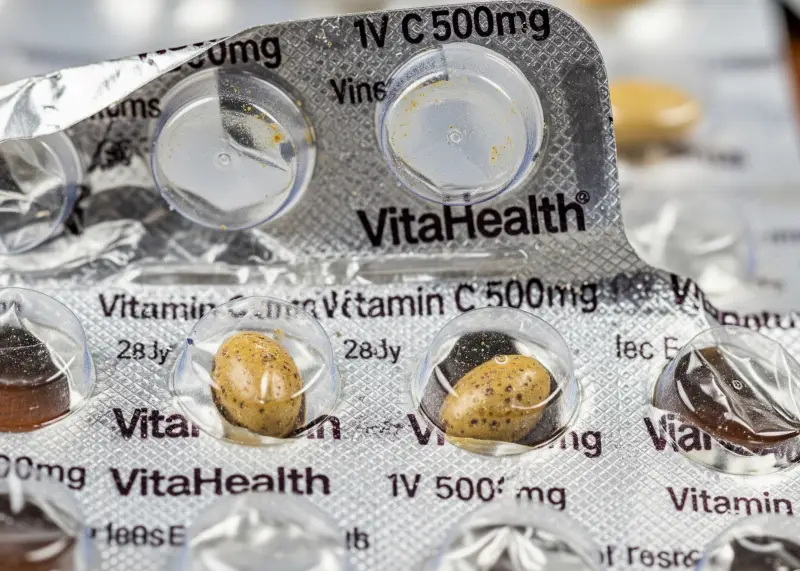
📊 Table 1: Red Flags for Fake Vitamins
| Checkpoint | Genuine Product | Counterfeit Product |
|---|---|---|
| Label printing | Sharp and clear | Blurry or misaligned |
| Expiration date | Properly stamped | Faded or missing |
| Packaging seal | Secure, tamper-proof | Loose or broken |
| Price | Consistent with market | Suspiciously low |
| FDA registration | Listed | Not found |
❓ Frequently Asked Questions (FAQ)
Q1: How common are fake vitamins in the Philippines?
They are fairly common, especially online and in small unregulated stores. FDA has issued several warnings about counterfeit products in recent years.
Q2: Can fake vitamins really harm me?
Yes. Depending on the contents, fake vitamins can cause side effects, organ damage, or even toxic reactions. At the very least, they waste your money and provide no benefit.
Q3: Are all vitamins sold online fake?
No. Many legitimate sellers operate online, but counterfeiters mix in with them. Always buy from verified brand stores or official pharmacy accounts.
Q4: What if I already bought fake vitamins and took them?
If you suspect you consumed fake supplements and feel unwell, stop immediately and consult a doctor. Bring the packaging with you so authorities can trace the source.
Q5: Why are fake supplements so widespread?
High demand, weak regulation in online markets, and Filipinos’ preference for cheaper options make the counterfeit trade profitable.
Q6: How can I report fake vitamins?
You can report them to the FDA Philippines through their hotline, website, or email. They regularly issue advisories and conduct raids on counterfeit operations.
Q7: Are local or international brands safer?
Both are targeted by counterfeiters. What matters most is where you buy – trusted pharmacies and official distributors are safest.
Q8: Is there a way to test vitamins at home?
Not accurately. While some suggest dissolving tablets in water to check purity, this is unreliable. Laboratory testing is the only sure method.
Q9: Do fake vitamins look exactly like real ones?
Some counterfeits are very convincing, mimicking packaging down to holograms. That’s why FDA verification and buying from trusted sources are crucial.
Q10: What’s the safest step to avoid fake supplements?
Buy from established pharmacies, check FDA registration, and be cautious with online sellers offering big discounts.
✨ Protecting Filipino Families from Counterfeit Health Risks
The rise of fake vitamins in the Philippines is more than a consumer issue – it’s a public health concern. For families who work hard to stay healthy, being tricked into buying counterfeit supplements is both a betrayal of trust and a direct threat to well-being.
This challenge reflects broader systemic issues: weak regulation in online markets, lack of awareness among consumers, and a counterfeit trade that exploits Filipinos’ desire for affordable health solutions. The lesson is clear: protecting your family starts with vigilance.
But beyond consumer responsibility, the government must also step up. Stricter monitoring of online platforms, faster FDA crackdowns, and heavier penalties for counterfeiters are needed. Health should never be compromised by profit-driven fraud.
For now, Filipino families can protect themselves by choosing trusted sources, verifying products with the FDA, and staying alert to red flags. Because in a country where health care is costly and prevention is vital, the last thing families need is to risk their well-being on fake promises in a bottle.
🦺 References
-
Inquirer – NBI: Pampanga Raid Finds Fake Vitamins
-
Trade.gov – Vitamin Regulations & Buying Safety PH



